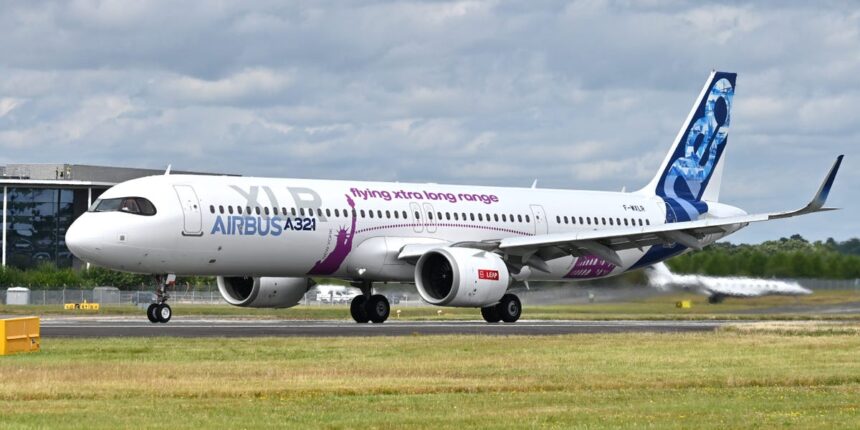“`html
John Keeble/Getty Images
- Airbus announced a profit of €983 million ($1 billion) for the third quarter, while Boeing reported a loss of $6 billion during the same timeframe.
- The European manufacturer has secured more orders and is managing supply-chain challenges more effectively.
- Currently, Airbus’s market capitalization exceeds Boeing’s by approximately $28 billion.
On Wednesday, Airbus unveiled its financial results for the third quarter, highlighting its competitive edge over Boeing.
The European aerospace giant recorded a quarterly profit of €983 million ($1 billion), starkly contrasting with Boeing’s reported loss of $6.1 billion last week.
According to UBS analyst Ian Douglas-Pennant, investors should find reassurance in Airbus’s profit margins; however, concerns regarding supply chain vulnerabilities may temper this optimism.
The stock experienced a slight dip on Thursday before rebounding. While shares have remained relatively stable throughout the year, Airbus boasts a valuation around $123 billion—$28 billion higher than that of Boeing. Notably, its stock has plummeted nearly 40% this year alone.
1. Building Customer Trust
Since 2019, Airbus has consistently outperformed Boeing in sales following the prolonged grounding of the 737 Max due to two tragic crashes that claimed nearly 350 lives.
Boeing faced customer dissatisfaction after an incident involving Alaska Airlines’ 737 Max earlier this year raised quality control concerns and disrupted production schedules.
In just nine months this year, Airbus secured an impressive total of 667 gross orders—more than double that of Boeing’s mere 315 orders during the same period.
The A320 family from Airbus continues to dominate single-aisle aircraft sales and is poised for further success with its innovative A321 XLR model designed for longer routes. The first unit was delivered to Iberia Airlines on Wednesday.
Courtesy of Airbus
On that same day, Riyadh Air placed an order for 60 units of the A321neo despite earlier speculation suggesting they might choose Boeing’s offerings instead for their single-aisle fleet expansion plans.
2. Effectively Managing Backlogs
Apart from securing sales contracts, timely aircraft deliveries are crucial in maintaining investor confidence and satisfaction among clients alike.
Royal Bank of Canada analyst Ken Herbert noted that “the primary focus among investors is ensuring successful execution in aircraft deliveries.”Boeing currently faces over
5,400 orders while
Airbus holds approximately
8,750 backlogged requests.Boeing currently faces over
5,400 orders while
Airbus holds approximately
8,750 backlogged requests.Both manufacturers are grappling with significant supply chain constraints affecting labor availability and raw material procurement; however,
Airbus appears better equipped to navigate these challenges successfully.
This year alone,
it has managed to deliver
497 planes compared
to only
291 by
Boeing.
Morningstar analyst Nicolas Owens emphasized that “Airbus’s main objective remains ramping up production rates beyond pre-pandemic levels.”
Similar trends as last year’s performance indicate increased deliveries expected within Q4,
allowing them to meet their target goal set at delivering
770 planes overall.
Deutsche Bank analyst Christophe Menard remarked on this guidance confirmation as ”arguably one major surprise from their release.”
< / figure >
A critical challenge facing
Airbus involves limited access concerning jet engines;
Bank Of America analysts expressed ongoing concern regarding this issue but acknowledged: “It seems like they possess sufficient resources needed towards achieving stated goals.”
Conversely,
Boeing encounters far greater obstacles:
regulatory bodies have imposed caps limiting production rates associated with their troubled models such as
737 Max;
additionally assembly lines have slowed down significantly due scrutiny surrounding manufacturing processes.
Moreover workers employed by
Boeing remain embroiled within ongoing strike actions now entering into seventh week amidst disputes related labor conditions.
3. Defense & Space Divisions
Commercial aviation constitutes most revenue streams across both companies; nevertheless each also maintains divisions focused upon defense & space sectors.
During Q3,
Boeings operations incurred losses totaling around $2.3 Billion primarily attributed military program setbacks;
furthermore it suffered additional costs amounting up-to-$250 Million linked Starliner project which encountered helium leaks resulting delays astronaut returns Earth after eight months instead eight days – courtesy Elon Musk’s SpaceX services rather own capabilities!
Meanwhile,
despite facing similar struggles;
recent announcements indicated potential layoffs numbering upwards towards
2500 employees alongside charges reaching €989 Million ($1.08 Billion) taken second quarter results released earlier month.
However;
this quarter saw positive EBIT earnings recorded amount €143 Million ($155 Million), including gains derived acquisition remaining stake OneWeb satellite constellation comparable Starlink service offered SpaceX competitor!
It appears competition posed by SpaceX could threaten business prospects both giants alike;
Faury refrained naming Musk directly during earnings call yet emphasized need transformation within European space industry maintain competitiveness against emerging global players including newcomers entering market landscape.
4.Stability In Leadership
Within duopolistic markets such as aerospace manufacturing sector it may seem tempting capitalize upon rivals misfortunes yet;
throughout turbulent times faced by competitors like boeing airbus maintained careful approach language addressing issues arising amongst peers’ struggles .
CEO Faury remarked February following Alaska Airlines incident stating “it makes us very humble” adding “never good when incidents occur regardless type plane involved”.
Commercial Aircraft CEO Christian Scherer reiterated sentiments expressed Farnborough Airshow July noting: “When one player loses direction our priority remains focusing efforts internally what we must accomplish here at air bus.”
Investors customers can derive confidence stability present leadership structure under Faury who confirmed shareholders will vote renewing contract soon upcoming meeting scheduled later month .
Since taking helm position since late2019 three individuals have led boeing through various crises including Dennis Muilenburg Dave Calhoun who were ousted amid different controversies surrounding troubled models such as737 max Kelly Ortberg assumed role August tasked turning things around post turbulent period marked strikes layoffs regulatory scrutiny impacting operations negatively overall performance metrics observed recently .
Source
“`





